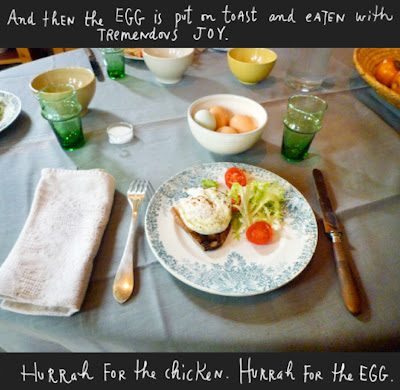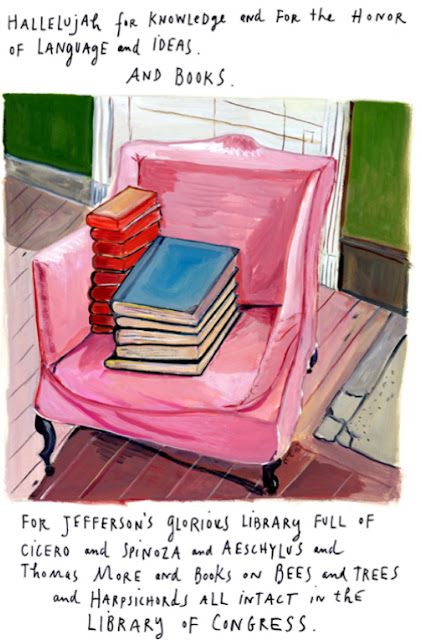...according to Cicero that is. But it makes sense to me.
I came across that quote some time ago but tonight I found it on the fabulous Maira Kalman New York Times blog "and the Pursuit of Happiness" from the 26th November, 09 post titled 'Back to the Land'
This delightful post manages to touch on some of my pet themes I've been known to bang on about - but she does it so eloquently, yet with humour and inventiveness of a great illustrator that she is. Do have a look at this post if time permits as I have simply pulled out some topical images - which takes away from the overall story!
This image above is from the Edible Schoolyard Project initiated by Alice Waters in 1994 (with considerable planning for the first 2 years!). In Australia we have the Kitchen Garden Project launched by Stephanie Alexander along the lines of the earlier project at Berkley in the US. During a stint teaching from 2001 to 2007 in Australian High Schools (NSW) I was amazed to discover what many were consuming during the school day, even in class. Missed meals often led to relying on energy from soft drinks, chips and chocolate. This confused relationship to food was alarming on mass every day - chocolate substituted for breakfast and could be purchased at the canteen - or from the constant fund-raising chocolate boxes on hand in class!
When a school student myself (many moons ago!) and later as a young teacher in the 1980's there was little or no junk food in the schools where I happened to be. This radical change I found in the 2000's after not being in a high school for 14 years shocked me as I noted all the changes to the food story - eg class parties consisting of pizza deliveries from franchises?!
I had been following the Edible schoolyard concept and slow food phenomenon for a long time, buying eggs, even chicken from bio-dynamic farming friends when possible, visiting markets and cooking from scratch much of the time. Demographics where I was teaching favoured the franchised fast food industry and so some of the local schools reflected this.
I tended to observe rather than say too much about it whilst in the school context. My lunch box often gave away my interest in whole foods and conversations starting from this angle were less controversial or bound to annoy stressed staff. Instead of confronting this issue head on I investigated implications of these new habits re food that I was expected to pay lip service to as a teacher. I wondered long and hard about how education curriculum and school policies could avoid the obvious. Everyone was talking obesity but few were talking real food and habits of daily life that are nurturing in the big picture sense and how things work to make a whole!
What I loved about the edible kitchen garden concepts for schools (plus Jamie Oliver and others from around the globe running such programs) is that they are inclusive... all children in the schools where these edible garden projects are set up are able to participate and learn about growing food from seeds, nurturing gardens through to harvest, & bringing this food to the table as nourishing meals. Here is a program that provides a complete understanding of where food comes from and how it is important socially, culturally, emotionally, intellectually and physically for a good life and that there shouldn't be a dividing line between the haves and the have nots. I say this because the food and nutrition we access can be such a huge reflection of our socio-economic situation and educational opportunities.
Before i forget, after that dense thought process, also by Maira Kalman is this post from January 2009 (one image shown below) referring to Obama's inauguration here.
see more at www.maira.kalman.com.



















































